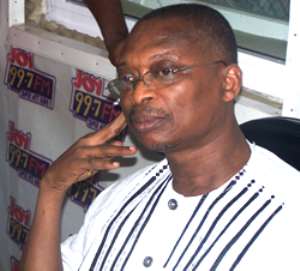
The Editor-In-Chief of the New Crusading Guide, Abdul Malik Kweku Baako Jnr. has described the 1966 coup that ousted Dr. Kwame Nkrumah as an illegality and an affront to democracy.
Mr. Kweku Baako who speaking on Joy FM's current affairs programme Newsfile over the weekend said the political justification that the coup was in response to Dr. Nkrumah's one-party state declaration is untenable.
According to him, even though there are records to show that a year after independence there were people who were scheming to overthrow Prime Minister Kwame Nkrumah, the Preventive Detention Act (PDA) which was, among others, introduced to put a stop to such future attacks, was abused.
He however stressed that it was not sufficient grounds to justify the 1966 coup.
“You cannot come and tell me that PDA was there so I had to effect a coup: one-party state was there so I had to effect a coup,” he indicated.
He added that “when the National Liberation Council repealed the PDA, they put in place the Protective Custody Decree (PCD). Indeed as Dr. Busia indicated in the inaugural speech on October 1st 1969... there were 1377 political prisoners in jail... The NLC took 1850 political prisoners.”
Mr. Baako stated that under the “PCD act, three CPP people died in prison, three CPP members- one of who was a member of parliament, died in prison: M.O. Kwatiah, Magnus George and E.A. Maclean. It's all documented; I have the prison records here.”
To him, people who believe in opening up the democratic state ought to have believed in it thoroughly and therefore should not have banned the CPP from the 1969 elections. “On what basis was the CPP as a political party banned from the 1969 elections,” he asked.
He indicated that “principles are indivisible. If the one-party state that had closed the door to all political parties provided opportunity for a coup, there are hardcore CPP elements who ask you how the CPP would have come back if [the] '72 coup had not occurred when [the CPP] had been banned by law.”
He said even though Nkrumah had his faults, it was a breach of the democratic process for any one to use a coup to chase him out.
“When I hear the attempt to justify those three coups (1966, 1971 and 1981) then my antennae rises. The bottom line is that the 1966 coup unleashed or opened the floodgates of coup d'etats,” he lamented.
The Deputy Communication Director of the New Patriotic Party (NPP) Yaw Buabeng Asamoa who was a co-panellist on the programme said the notion that the forebears of the New Patriotic Party were behind the coup that overthrew Dr. Nkrumah has been disproved by a book written by Prof. Kofi Awoonor, titled Ghana Revolution where the author described the military as the main masterminds of such coups because of the vested interest they had in the political system.
Quoting aspects of the book, Mr. Buabeng said certain ethnic groups in the military led the coup against the former president and that there is no link between the United Party (UP) tradition and the coup that overthrew Nkrumah.
On the use of the PDA by Nkrumah to jail people perceived to be his political opponents, Mr. Buabeng said Nkrumah could have protected himself and still encouraged multi-party democracy.
“All I'm saying is that in spite of all Kweku [Baako] has said, there was no reason for Kwame Nkrumah to turn this state into a repression in order to keep himself in power even if he thought he was doing us good,” he averred.
Mr. Buabeng further pointed out that the American democracy faced worse political crisis but the system still ran and Nkrumah could have learnt from them in protecting himself instead of instituting legislations to suppress his own people.
Story by Derick Romeo Adogla/Myjoyonline.com/Ghana




 Supreme court declares payment of wages to spouses of President, Vice President ...
Supreme court declares payment of wages to spouses of President, Vice President ...
 Publish full KPMG report on SML-GRA contract – Bright Simons to Akufo-Addo
Publish full KPMG report on SML-GRA contract – Bright Simons to Akufo-Addo
 Kumasi International Airport to begin full operations by end of June
Kumasi International Airport to begin full operations by end of June
 Election 2024: Our ‘real challenge’ is getting ‘un-bothered’ youth to vote – Abu...
Election 2024: Our ‘real challenge’ is getting ‘un-bothered’ youth to vote – Abu...
 [Full text] Findings and recommendations by KPMG on SML-GRA contract
[Full text] Findings and recommendations by KPMG on SML-GRA contract
 Renegotiate SML contract – Akufo-Addo to GRA, Finance Ministry
Renegotiate SML contract – Akufo-Addo to GRA, Finance Ministry
 J.B Danquah-Adu murder trial: Sexy Dondon to Subpoena Ken Agyapong, Ursula Owusu
J.B Danquah-Adu murder trial: Sexy Dondon to Subpoena Ken Agyapong, Ursula Owusu
 Galamsey: Five Burkinabes jailed 20 years each for mining
Galamsey: Five Burkinabes jailed 20 years each for mining
 'It's no crime' – Abu Sakara defends Alan's exit from NPP
'It's no crime' – Abu Sakara defends Alan's exit from NPP
 'We know all your houses, pay your bills now or we’ll disconnect you; we're all ...
'We know all your houses, pay your bills now or we’ll disconnect you; we're all ...
